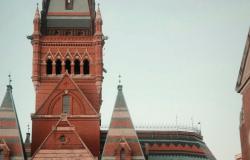Why Universities in America are the Target

Scott Montgomery on Trump's attack on intellectual culture.
Why has the Trump Administration gone after universities, particularly the Ivy League, with such a vengeance? The answers are several. There are historical precedents and even some contemporary parallels (Hungary, Turkey), though these pale in comparison to the Trump assault.
The political rationale is straightforward. Universities constitute small republics where the elite are trained, and dissent is encouraged. Their dependence on government largesse is large, even as they serve as centers of activism, often anti-government in nature. They instruct not only scholars and artists but journalists, scientists, engineers, lawyers, judges, business leaders, educators. This gives them—what is not often realized—enormous intellectual and cultural power and significance.
“We live in a world that has been made effectively by university knowledge,” Vice President Vance correctly noted in a 2021 speech. “[I]f any of us want to do the things that we want to do for our country…we have to honestly and aggressively attack the universities.” What the Trumpians want to do for America, however, has nothing to do with improving education by “protecting American students, families, and taxpayers from exploitative and unlawful practices,” as the president’s executive order claims. The accusations that Trump and Vance have put forward suggest they want two things: 1) a higher education system fully compliant with White House policies and demands; 2) a student body that is overwhelmingly white, Christian, conservative or libertarian, American-born, and dedicated to a career “at home.” This might not check all the boxes (it is not wholly clear what Trump wants).
Meanwhile, attacks on the Ivy League are conducted in the name of a false-flag crusade against antisemitism—a claim both transparently cynical and absurdly hollow as a pretense of moral rectitude. Whether universities rendered themselves more vulnerable to this by “woke” policies and politically outspoken presidents is no longer relevant. The far right has been for many decades deeply anti-intellectual in its bones. As early as 1951, William F. Buckley Jr. penned God and Man at Yale (1951), a jeremiad on the anti-religious, “collectivist” treason of U.S. higher ed. His ideas about the anti-American character of U.S. universities never left the intemperate margins of conservatism; but as the GOP slid deeper into extremes, its complaints that college should be an indoctrination center for traditional Christian, capitalist values have grown more militant. They now have their Commander-in-Chief.
Academia, however, is the one place in America where liberal democratic values—like those of its founders, are presumed to be - and often are - at a high level in modern society. This means freedom of speech, thought, inquiry, publication, and instruction. Such freedoms are never absolute or ideal, to be sure. There are campus limits on “hate speech” and certain behaviors, and there are the strictures of intellectual orthodoxies. Intolerance is far from unknown; points of view are unfortunately and hypocritically shouted down. Yet compared with corporate, commercial, or bureaucratic cultures, which typically operate (as Orwell noted) like tyrannical systems, college work and life have many envied freedoms - another reason autocrats find the institution threatening.
The offensive has targeted a domain we might expect to be untouchable: the sciences. For authoritarians, science presents both a challenge and a conundrum. It demands much freedom and openness, therefore independence, but it is also a vital source of economic success and military power, as well as prestige, and it depends deeply on government support. This was the post-WWII deal that was struck—federal investment in research to stimulate innovation, prosperity, and national security. Not only did it succeed, it showed that openness and independence are the required conditions. The tragic opposite was Stalin’s autocratic zealotry and his purges of the 1930s and 40s. These eviscerated Russia’s research enterprise and did it so well that Stalin was accused by his inner circle of handicapping Soviet capabilities in the face of Nazi war-making.
Neither Trump, Vance, Elon Musk, or any other member of the regime appears to understand or care about the spectacular damage they are wreaking upon American science. Eliminating government research programs and grants, slicing scientific agencies in half, cancelling multi-year, multinational projects, the list goes on. Stalin effectively destroyed what should have been one of the world’s great scientific cultures. The Trumpians seem bent on a newer version of this idiocy. The only thing missing is some type of ideology—there seems no real reason for the damage that is being done.
It may all be related to the broader assault on academia. The sciences bring in the largest federal money for universities, so injury here will add much damage to the institution. That this will hamstring innovation, weaken the economy, impact public health, hand global supremacy to China, has been repeatedly expressed in other less than dulcet tones. But this doesn’t seem to matter. It is possible that Trump wants to shift basic research to corporations, thus the private sector. This, however, would mean that a huge amount of inquiry would never get done. Companies aren’t particularly interested in the precise composition of the Earth’s lower mantle or the first tools fashioned by homo erectus.
How is America’s scientific community responding? A recent issue of The Economist states that “Now…many of America’s top scientific minds are troubled.” This is like saying Ukraine President Zelensky is no longer happy that Russia wants to destroy his country and assassinate him. Scientists in the U.S. are in panic and shock. In my own university, as in many others, researchers are considering, pursuing, and accepting opportunities in Europe and elsewhere.
Finally, why is so much aggression being directed against the Ivy League, Harvard above all. Here, the answer is simple: these are the assumed leaders of American academia, the head of the snake—cut this off (damage them seriously), and others will either fall in line or be more easily brought to heel. While this counts as a misperception—the Ivies are private entities, while most research universities are public—it has enough truth to inspire growing levels of collective resistance by universities, and, on Harvard’s part, legal counter-attack.
In the latest salvo, delivered first at Harvard but now threatened as a national policy, Trump has tried to bar future international students from coming to the US for college. Blocked by a temporary restraining order from a Boston federal judge, the move against Harvard would severely impact university finances (international students often pay 3-4 times the tuition of US citizens). No less, it would decimate a majority of STEM graduate programs coast-to-coast. Nearly half of students in these programs are from outside the US.
The threat posed by the Trump Administration to American higher education, to scientific research, and to the nation, is equivalent to the invasion of a hostile power bent on suppression and dismantling of civic society. The attack on universities, on science, and on international students, is an attack on the larger world of knowledge and its advancement. Under this administration, America has become the enemy of everything admirable and beneficial it has given to intellectual culture in more than a century.
Photo by Sasha P


